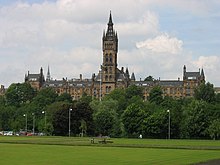The Historiographer Royal is a member of the Royal household of Scotland. The office was created in 1681, and was in abeyance from 1709 until 1763 when it was revived for Principal William Robertson of the University of Edinburgh.
Sir Kenneth Charles Calman, HonFAcadMEd is a Scottish doctor and academic who formerly worked as a surgeon, oncologist and cancer researcher and held the position of Chief Medical Officer of Scotland, and then England. He was Warden and Vice-Chancellor of Durham University from 1998 to 2006 before becoming Chancellor of the University of Glasgow. He held the position of Chair of the National Cancer Research Institute from 2008 until 2011. From 2008 to 2009, he was convener of the Calman Commission on Scottish devolution.
John Duncan Mackie CBE MC (1887–1978) was a distinguished Scottish historian who wrote a one-volume history of Scotland and several works on early modern Scotland.
Máel Petair of Mearns is the only known Mormaer of the Mearns. His name means "tonsured one of (Saint) Peter".

The Kingdom of Alba was the Kingdom of Scotland between the deaths of Donald II in 900 and of Alexander III in 1286. The latter's death led indirectly to an invasion of Scotland by Edward I of England in 1296 and the First War of Scottish Independence.
Professor Dauvit Broun, FRSE, FBA is a Scottish historian and academic. He is the chair of Scottish history at the University of Glasgow. A specialist in medieval Scottish and Celtic studies, he concentrates primarily on early medieval Scotland, and has written abundantly on the topic of early Scottish king-lists, as well as on literacy, charter-writing, national identity, and on the text known as de Situ Albanie.
Andreas or Aindréas of Caithness is the first known bishop of Caithness and a source for the author of de Situ Albanie. Aindréas was a native Scot, and very likely came from a prominent family in Gowrie, or somewhere in this part of Scotland. He was a prominent landowner in Gowrie, Angus and Fife, and it is likely that he was a brother of one Eòghan "of Monorgan", another Gowrie landlord. At some stage in his career, he was a monk of Dunfermline Abbey, though it is not known if this was before or during his period as bishop of Caithness.
Professor Archibald Alexander McBeth Duncan, FBA, FRHistS, FRSE was a Scottish historian.
Sir Thomas Broun Smith was a British lawyer, soldier and academic.
David Alexander Syme Fergusson is a Scottish theologian and Presbyterian minister. Since 2021, he has been Regius Professor of Divinity at the University of Cambridge.
Sir Charles Duncan Rice was a Scottish academic who was Principal of the University of Aberdeen from September 1996 to 1 April 2010. He previously served at New York University in the United States, as Dean of the Faculty of Arts and Science (1985–91) and Vice-Chancellor (1991–96).

Andrea Nolan is Professor of Veterinary Pharmacology and Principal & Vice Chancellor of Edinburgh Napier University. In 1999, she was the first woman ever appointed to head a British veterinary school.
Sir Robert Sangster Rait was a Scottish historian, Historiographer Royal and Principal of the University of Glasgow.

The Chair of Conveyancing was a Professorship at the University of Glasgow, active until 2014. It was founded in 1861 and endowed by the Faculty of Procurators in Glasgow. It was a part-time post, and holders were generally solicitors in private practice. The last holder of the post was Professor Robert Rennie, before he retired from the role in 2014.

The Chair of Mercantile Law is a Professorship at the University of Glasgow, founded in 1919. It has had five holders, including politician Sir John Craik-Henderson and Robert Jack, one of Scotland's most noted contemporary commercial lawyers, and has been vacant since 1993.
Edward McCombie McGirr (1916-2003) was Muirhead professor of medicine at Glasgow Royal Infirmary, a former President of the Royal College of Physicians and Surgeons of Glasgow and Dean of Faculties at the University of Glasgow.
Thomas Jones Mackie CBE FRSE LLD was a noted Scottish bacteriologist; Dean of the Faculty of Medicine, University of Edinburgh; and author of medical research textbooks.
Sir Michael Richard BondFRSA FRSE FRCPsych FRCPGlas FRCSE is an English physician and medical researcher, whose specialism lies in the study of pain. He has held a number of national and international appointments in his field and was Professor of Psychological Medicine at the University of Glasgow from 1973 to 1998.
The Convention of Royal Burghs, more fully termed the Convention of the Royal Burghs of Scotland, was a representative assembly which protected the privileges and pursued the interests of Scotland’s principal trading towns, the royal burghs, from the middle of the 16th century to the second half of the 20th century. It evolved as a forum in which burgh delegates, termed "commissioners", could "consult together and take common action in matters concerning their common welfare" before and during the sittings of parliament. An exclusively merchant body, it was essentially a parliament which "declared the law of the burghs" just as the Scottish Parliament "declared the law of the land". The Convention expanded over time by admitting lesser burghs to its membership; and by the 16th century had grown in influence to the extent that "it was listened to rather than directed by the government". Though still known as the "convention of royal burghs", it referred to itself from the late 17th century onwards as simply the "convention of burghs", as by then membership was no longer restricted exclusively to royal burghs and commissioners from all types of burgh were represented in parliament.
John Mavor was a pioneer in the design of MOS transistors and Charge-Coupled Devices (CCDs) for signal processing. During his career as an educator and researcher at the University of Edinburgh he was appointed Professor before becoming Dean of the Faculty of Science and Engineering. He was subsequently appointed as Principal and Vice-Chancellor at Edinburgh Napier University.




